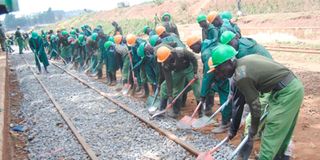A national environmental youth corps can help create many jobs

A team from the National Youth Service (NYS) put ballast along the railway line in Elburgon, Nakuru County that provides stability of the track in this photo taken on March 30, 2021 during the ongoing rehabilitation of the Nakuru-Kisumu Railway line.
Youth unemployment is a global challenge with many governments struggling to find ways to give young people meaningful work. The situation is even more serious in developing countries, where economies are small and jobs limited.
However, the agricultural and environmental sectors can create many jobs. Unfortunately, in Kenya, young graduates in areas such as agricultural sciences, natural resources, conservation, tourism and marketing have great difficulty finding jobs.
We can learn from the youth empowerment project that President Roosevelt introduced in the US in the 1930s. It was meant to provide American students with work experience in environment-oriented projects during their summer holidays. It was highly successful and, 50 years later, in the 1990s, staff members at UN Headquarters in New York, including myself, discussed how it could be applied in developing countries.
In my service as UN Resident Coordinator and UNDP Resident Representative to Lesotho, I sought to introduce the concept in 1993. Then, Lesotho was grappling with high youth unemployment along with substantial biodiversity loss. With strong government backing and initial support from UNDP, we developed a project which, in 15 months, had made excellent progress, encouraging other donors like the European Union, the Netherlands, the United Kingdom and USAid. By 2000, the government of Lesotho had nationalised the youth project and included it in its budget.
The success also caught the eye of other agencies. That year, the Executive Secretary of the United Nations Convention to Combat Desertification visited Lesotho. After touring a few project sites, he decided to replicate it in seven other African countries and mobilised funds from a range of donors.
Developing a National Environmental Youth Corps (Neyc) in Kenya can address three development challenges: Youth unemployment, environmental degradation and biodiversity loss, and poverty. It would create jobs for rural and urban youth aged 15-25 by launching a range of environmentally sustainable income‑generating activities.
Specific training will equip them with skills and open their minds to worthwhile career opportunities outside the very limited white-collar sector. They will learn entrepreneurial skills, financial management (including business plan development), e-marketing (including information and communications technology and value addition focusing on markets, local and foreign).
University and high school graduates will be encouraged to draw on their creativity and energy to take up the opportunities.
Below are some potential Neyc activities.
Eco-tourism: Kenya is an international tourist destination and tourists need tour operators who are bilingual and knowledgeable about the country. They can be given international training to guide tourists around our many beautiful natural and heritage sites.
Waste management: In many countries, waste collection is a lucrative activity. Working with the private sector and the Youth Development Fund, vehicles for waste collection could be bought for young entrepreneurs living and working in urban areas.
Hay harvesting: In many regions, especially semi-arid areas, pasture for livestock is a huge challenge, especially during the dry season. Young people could grow and harvest grass for sale as hay to livestock farmers and collect and sell manure to eco-farmers.
Recycling: Kenya generates a lot of waste, especially in Nairobi, and this problem could be turned into an asset. Lesotho’s project trained youth to make recycled products such as exercise books, toilet paper and other paper goods, which were then sold to schools, stores and offices. Kenya already has projects in this area, such as the amazing community-based recycling initiative in Watamu.
Support, in cash and kind, will be sought from donors, the government, and the private sector, especially commercial banks and big companies. The programme would be managed by a team organised as a sacco or association, which would help young people to access financial assistance and other necessary inputs for their start-ups.
Dr Kakonge is a former Ambassador/Permanent Representative of Kenya to the UN Office and WTO in Geneva. [email protected].





